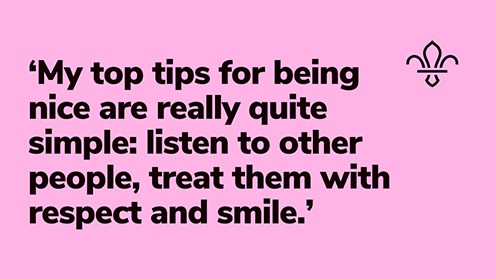Chief Commissioner, Tim Kidd, challenged Team UK to come up with ideas on how we can foster a culture of positivity and respect, helping us wear our values on our sleeves
I’ve been thinking a lot recently about something that sounds quite simple: how can we be nicer to each other? We’re part of a global family who share the same values and work towards the common goal of preparing young people with skills for life. As a team, Scouts are some ofthe most decent, optimistic and generous people I’ve ever met.
But as I’ve discussed before, sometimes in the heat of the moment, we forget ourselves – especially online, when we occasionally treat each other with less respect that we deserve.
I asked Team UK whether they had any advice for us in terms of treating each other well. They came back with some brilliant thoughts, which I wanted to share with you here.
Rise above negativity and be compassionate
By Kester Sharpe, Deputy UK Chief Commissioner
‘You never know what someone might be dealing with at a particular time that might cause them to react in a negative way. Try to rise above any negative behaviour or remarks and treat others (whatever their reaction might be to you) with respect and compassion. Often it prompts them to reconsider their behaviour.’
Be true to yourself and do the right thing
By Stephen Donaldson, Chief Commissioner of Northern Ireland
‘Let’s try and act with integrity in all we do. Sometimes it is easy just to make the popular choice, even when we know it’s wrong. As Scouts, we should always try to do the right thing even when that can lead to tough situations. If you have the feeling that something is right, then go with that option, however difficult that may seem. It will turn out to be right in the end.
Be honest with people you deal with. Never pretend it’ll be OK if you know there is going to be a problem. Leadership puts you in a position of trust – never abuse that trust by being disloyal or dishonest to those that you lead. Listen to the opinion of others and let them know their opinions are valued.
Last year at the Queen’s Scout Service at Windsor, the service lead team of Explorers played a piece of music called Proud (‘What have you done today to make you feel proud?’) by Heather Small. Look it up on You Tube, listen to the words, and do something every day to make you feel proud.’
Challenge with courtesy
By Rhian Moore, Chief Commissioner of Wales
‘I think challenge is good and it encourages us to make the best decisions possible – when we challenge with courtesy and kindness, wonderful things can happen. Caring for others isn’t about getting our own way or claiming the glory for decisions. It’s about working together to grow ideas, add some different perspectives, a dash of kindness and a splash of respect for others, and then we have the perfect recipe that will empower young people to be amazing.’
Smile and treat people with respect
By Wendy Human, UK Commissioner Programme (Assurance)
‘My top tips for being nice are really quite simple: listen to other people, treat them with respect and smile. I think it’s really important to have the time to listen to others and understand what their values are. It is equally important to treat them with respect, which to my mind means treating others as you would want to be treated yourself. I also find a smile goes a long way.
My other top tip is to always say thank you and to mean it. This but has certainly helped me to survive some difficult situations and deal with some difficult people.
Have great conversations and think ‘win win’
by Alex Peace-Gadsby, Chief Commissioner of England
‘Try to listen to what others are saying with the intent to understand them, rather than to reply. We all want to get our point across but, when we listen focused on doing this, we only hear certain parts of the conversation and can miss the meaning entirely. If we are listening to be understood, we are preparing what we are going to say and the questions we are going to ask in our heads and we filter everything through our own view.
Consequently, we can decide prematurely what the other person means before they finish communicating. This means we can accidentally end up judging, trying to give advice and solutions when people just want a listening ear. By listening to understand before we then seek to be understood ourselves, we can get through some of the most difficult situations much more positively and fairly.
Another good tip is to think ‘win-win.’ I always look for a win-win in every situation because, when one side benefits more than the other (win-lose), it might look like success in the short term but, in the long run, it can breed resentment and mistrust.
It may mean someone won’t work with us again, so in effect, everyone has lost. In the long run, if we both don’t win, we both lose out. Win-win is very much within our values and looks at life as a cooperative rather than competitive arena that looks for benefits and solutions for everyone. Sometimes, finding a win-win can take more time and energy, but it’s always worth it.
Listen and show your empathy
By Ollie Wood, UK Youth Commissioner
‘I believe that listening is so important. We have one mouth and two ears. Using them in proportion and showing empathy to whoever you’re talking to will not only help you find common ground, but will ensure your communications are more effective too. They’re also more likely to think that you’re a person who they would want to spend time with again.’
Say thank you and show people they’re valued
By CJ Ledger, UK Commissioner for Perception
‘Two words can make a big difference. How often do you say thank you? As volunteers, we give freely of our time to benefit young people. But stopping to say thank you or to recognise the time and effort someone has put in can really help someone feel noticed and valued.
All of us have things going on in our lives that affect what we do and say. It might be that they’re having to care for an unwell relative, waiting for the results of medical tests, or have an issue at work, for example. When talking to people, always be aware that there may be more going on than you realise and that may impact on their behaviour.
If someone isn’t responding to emails or if they’re being curt in conversations, then all of these are clues that something could be going on in their lives. How often do you ask: ‘how are you?’ and really listen, to pick up when the ‘’I’m fine thanks’ isn’t fine? Just noticing someone might not be ok and offering your support can go a really long way.’
And a final last word from our Chief Scout…
Be kind; be courageous
By Bear Grylls, Chief Scout
‘Kindness inspires us, it motivates us, and creates a strong, tight team: honest, supporting, empowering. Let’s make courage and kindness the hallmark of UK and world Scouting.’

